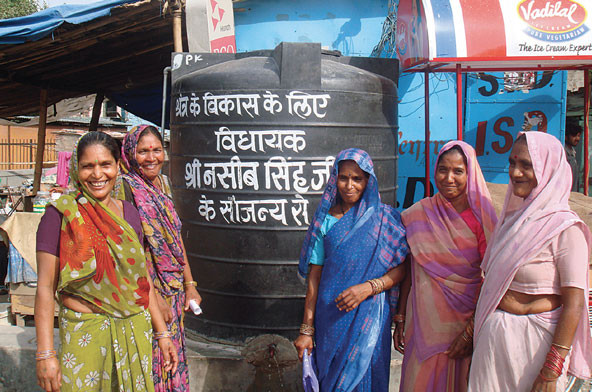 MHT members showcase a new community water tank in Ahmedabad, India’s sixth-largest city. (Photo courtesy of MHT)
MHT members showcase a new community water tank in Ahmedabad, India’s sixth-largest city. (Photo courtesy of MHT)

Imagine living in a slum in India without a toilet in your home. Every time you have to relieve yourself, you must walk 15 minutes to the community toilet, a run-down set of stalls that lack a water connection, electricity, and handwashing facilities. Of the dozen or so toilets there, perhaps three still work, although the stalls’ windows and door latches are missing. In the mornings and evenings, when many people want to use the toilets, you have to wait a long time for your turn, and people often cut the line, jostling their way to the front. To avoid this chaos, you often find a gutter, a dumping ground, or a secluded place along the railway tracks to do your business.
That is, if you’re a man. If you’re a woman, relieving yourself in the open during the day makes you a target for harassment and even assault. So you drink very little water and hold your bladder for up to 15 hours a day. It doesn’t matter if you are menstruating or pregnant, you relieve yourself in the open only before dawn and after dusk, under the cover of nightfall. The practice increases your risk of urinary- and reproductive-tract infections, as does the act of defecating in the open itself. But there is no alternative.
Fifteen years ago, this was the reality that women living in the slums of Ahmedabad, Gujarat’s largest city, which has a population of more than seven million, said Bijal Brahmbhatt, director of Gujarat Mahila Housing SEWA Trust (MHT). It’s what compelled MHT to use the power of women’s collectives to transform the sanitary conditions in Ahmedabad, marking one of the biggest challenges that the organization had ever faced. Today, those same women are building on success and setting their sights on other goals that will help their communities thrive.
Grassroots Efforts
To tackle the sanitation challenge, MHT initially helped establish a community-driven sanitation movement called Parivartan (Change). The organization sought out women who seemed to be the informal leaders in the affected communities, and those women, in turn, helped MHT organize small groups of women into Community Based Organizations (CBOs). CBO members were trained to plan sanitation solutions and to demand entitlements such as household toilets and water connections under various government programs. CBOs also made sure that the movement would sustain its momentum by monitoring the upkeep of facilities once they were built. MHT also tapped government programs to help fund the toilets.
Ultimately, community members have paid for onethird of the project costs, in installments—with the government paying the rest. And in the 15 years since its inception, the Parivartan approach has reached communities in seven Indian states. Additionally, MHT has overseen the establishment of 746 CBOs in 895 slums, helped train more than 13,000 CBO leaders, and provided toilets to nearly 90,000 households.
Broadening Aspirations
Successfully gaining sanitation entitlements from the government has proved to be a transformational experience for CBO members. As an additional benefit, the initiative prompted many women to open bank accounts for the first time, giving them a financial identity that would hold them in good stead in the future. And once women had the skills to effectively advocate for their communities, they turned their attention to other pressing needs.
For example, one woman leader approached a private company to get electricity for her slum. At first, the company was wary. Fresh connections cost INR 6,000 ($90)—could slum dwellers afford this, and would they ever be a profitable market? With MHT’s backing, however, the company agreed to pilot a program that turned out to be a resounding success. At the end of the pilot, it rolled out a program for the urban poor that did away with the connection fee, folding it into their monthly bills instead. This practice led to the installation of more than 180,000 new electricity connections, serving nearly one million people.
What’s more, many of the original CBOs have since organized into larger, citywide federations and now help guide city planning. CBO leaders are members of the City Sanitation Task Force and Zero Waste Management Committee in Ahmedabad, where they advise on government programs affecting the city.
As CBO member Meena Soni says, “When I heard of MHT and became a part of the CBO, I never thought we’d form a city-level federation. Working with the local government was unthinkable, but things worked out with time. Similarly, devising small solutions and preparing ourselves and the community for the future is not a faraway goal.”
MHT’s next goal is to extend coverage to even the most isolated women and their families. “The last 20 percent is always the hardest, because it involves changing the behaviors of people who have been the most marginalized,” says Brahmbhatt. “No one yet knows how to achieve that last stretch—but then no one knew how women from Ahmedabad’s slums could get household toilets or join urban planning bodies, either.”
Support SSIR’s coverage of cross-sector solutions to global challenges.
Help us further the reach of innovative ideas. Donate today.
Read more stories by Vishal Kapoor.

